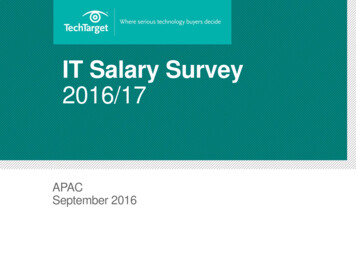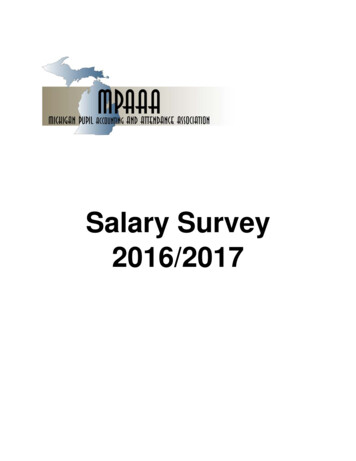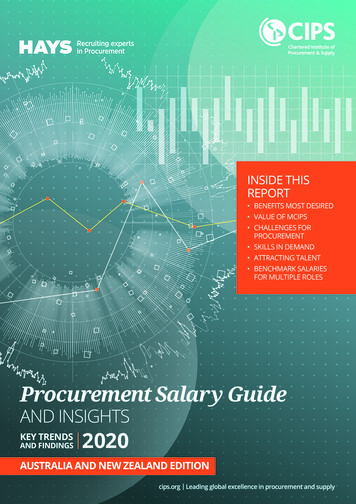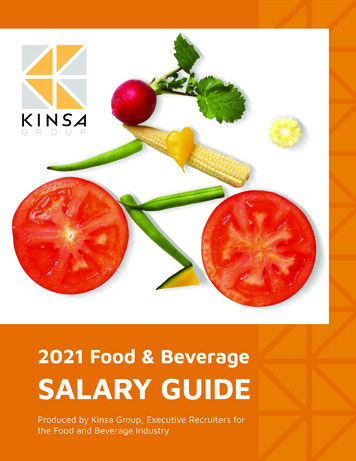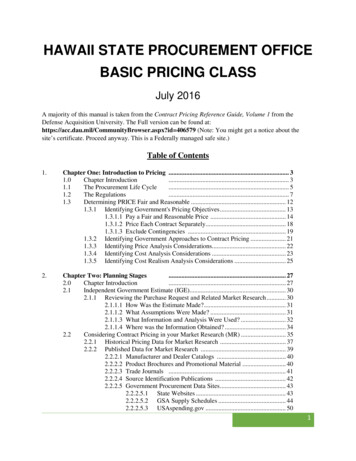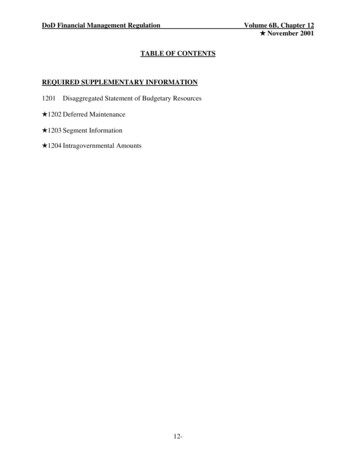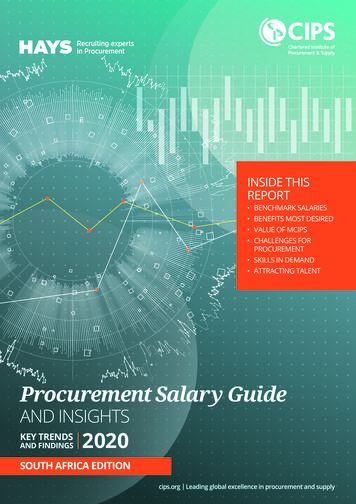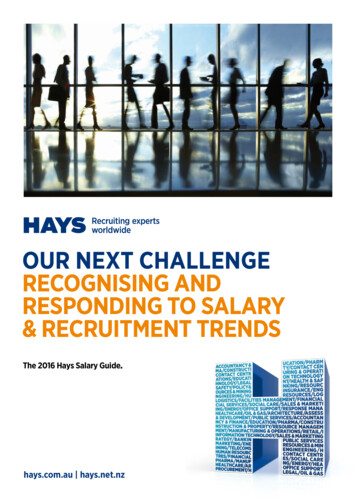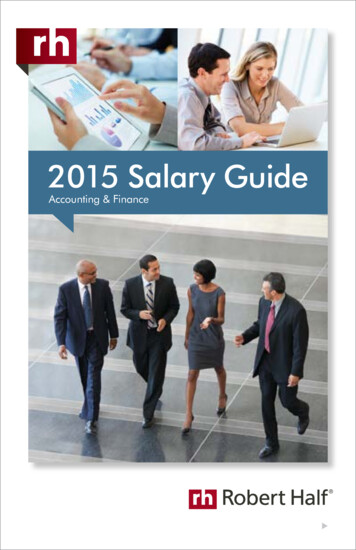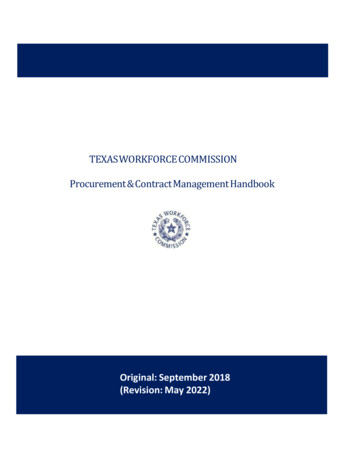
Transcription
Procurement SalaryGuide and InsightsSub-Saharan Africa RegionKey Trendsand Findings2018
Procurement SalaryGuide and Insights 2018What a time it’s been since the last survey and what a different world we are now operatingin. The direction of travel is full of unexpected twists and turns and a new world orderawaits us with protectionism, potential tariffs and new challenges.Businesses and organisations will need asteady hand to negotiate their way throughall this, so it is a perfect time to have thesupport of trained, qualified professionals.These professionals will need strategic skills,data management and a steadyingdisposition to help businesses find theirway through the particular challengesfaced by their organisations.Once again, the CIPS/Hays Salary Survey hasfound that these talented individuals areincreasingly in demand by CPOs. Though CEOsand Boards must still learn the lesson of thevalue that procurement can bring, these newtests are a spotlight on procurement’s worthduring this remarkable time in our history.Many CPOs I speak to are struggling to securegood talent, but it is often soft skills that aremissing from their talent portfolio, and notprocurement and supply chain knowledge.Though sector knowledge is always useful,both sector and procurement knowledge canbe learnt, so I would urge any employers to gofor individuals with a fresh perspective and theability to think outside of the box.So that’s the benefit of talented individuals forbusiness and procurement teams, but thosesmart professionals are getting rewarded too.Our survey found that 49% of procurementprofessionals received a salary increase in thelast year.And, it’s no surprise again that MCIPSprofessionals received 32% more in salarythan non-MCIPS, so the value of CIPSmembership is there for all to see. But, wemust not rest on our laurels. Continuingprofessional development should be high oneveryone’s agenda, to always improve and findthe next level of achievement, so I hope thatthis year our professionals will read more anddo more to up their game and increase theirusefulness so boards and CEOs also sit upand take more note of how fundamental goodprocurement is for their business.Nearly half (46%) of employers say they havefaced challenges finding the right talent inthe previous 12 months. This could be theconsequences of searching for exceptionaltalent rather than volume, for experience asopposed to expedience. Taking time to lookfor the right team will always pay off in thelong run and those interesting, varied andrewarding roles are still out there.Lastly and disappointingly, the survey foundthat the gender pay gap in our professionis not closing. Though there are so manyinstances of this in other sectors, I’mdisappointed that procurement is not leadingthe way and bucking the trend. Raisingthe profile of women professionals andsupporting gender diversity has been a focusfor CIPS in the last year with our Women inProcurement event and the recognition ofhigh achievers. I hope these small steps willcontribute to a reversal of this setback innext year’s results as we do more to supportgender diversity in procurement.I would urge you to look through the reportin detail to understand what it means foryou. There is no other report of this scalethat gives insight into the profession acrossgeographical regions, gender, sectors andcompany size. This is not just about pay andbonuses but the impact of CIPS membership,how procurement can fight against issuesof our day such as modern slavery and theopportunities for great work and how to makean impact.So to paraphrase the wise words of a formerPresident of the United States, ask not whatthe profession can do for you, but what youcan do for the organisations you work for andthe wider world.Gerry WalshGroup CEOChartered Institute ofProcurement & Supply02 www.CIPS.org/salarysurvey
Building soft skills for thefuture of procurementWe are pleased to be partnering with CIPS for a fourth year to continue to provide insightinto the key trends and issues impacting on the procurement and supply chain profession.Our report shows a continual upward trendin the value placed on procurement withinorganisations. Building a strong procurementteam continues to be a priority for leaders inthe industry, driven by a number of pressureswithin the market. As organisations continueto adapt to a changing landscape, so too mustprocurement professionals to ensure theirsoft skills in particular are up to date to meetthe challenges to come.Finding the right people is of paramountimportance to be able to build the best team. Itherefore encourage both procurement leadersand professionals to review the CIPS GlobalStandard for Procurement and Supply 2018,a comprehensive competency frameworkwhich sets the benchmark for what good lookslike in the industry. One aspect the Standardcovers is People Development, a section I haveThis year’s report clearly indicates thatthere continues to be a strong demand forprocurement professionals with demandconsistently out-pacing supply. Furthermore,there is clear evidence that this pattern ismirrored in the UK, Australia and South Africa.The value of CIPS qualifications is clearlyindicated in the report with professionalshaving been awarded MCIPS* enjoyingsalary increases on average 32% greaterthan employees in similar roles without CIPSqualifications.The context of a labour market in whichdemand is outstripping supply places apremium on attracting and retaining the verybest procurement professionals. Nowhere isthis more clearly indicated than in the increasein salaries, being paid to graduate trainees, acontributed to and a factor that is important tome. Individuals can use this to identify the softskills that will enable them to progress in theircareer and seek the training they need to beable to develop.Our report also highlights the ongoingissues that employers face when recruiting.Professionals with the right soft skills are ofgreat importance, however can be difficultto find. This can be especially challengingwhen seeking talented senior procurementprofessionals, who are all the more importantto bring about the change which is high on theagenda for many organisations.who have the potential to become futureprocurement leaders. We provide workshops,events and access to information to helpprofessionals build the right soft skills andnetworks to be able to progress to FCIPS, aswell as educate them about the importanceof soft skills in the changing world ofprocurement.We hope you find the insights we cover in thisreport useful in your workforce planning, or asa guide for your own career development.hays.co.uk/procurementScott DanceI am therefore pleased to be involved in theFellows of the Future programme**, whereHays is partnering with CIPS, and which aimsto build a pipeline of talented professionalsDirectorHays Procurement & Supply Chainsignal that the profession is seeking to attractthe very best talent that is available. A furtherinteresting trend, buried in the detail of thereport, are the premiums paid to procurementprofessionals who are designated ‘analysts’.Many of these professionals work in the‘engine room’ of the profession and theirenhanced salaries reflect the requirementof the procurement profession to deal withthe realities of; big data, predictive analytics,eProcurement, AI and machine learning.In general, the outlook for procurementprofessionals remains excellent. Demandfor their services outstrips supply and this isreflected in healthy wage appreciation. Theprofession is battling to attract the best talentavailable and seeking to equip that talent withthe skills that are required of a professionservicing businesses operating in a quicklyevolving environment. Those professionalswho develop their capabilities will enjoysuccessful and remunerative careers and thereis clear evidence that CIPS can help them onthat journey.In previous reports, we highlighted theincrease in learning and development spendas organisations tried to address the lackof talent by growing their own. This wouldappear to have been successful as only 60%of organisations report that finding the righttalent was a major challenge for them.Dr. John GlenCIPS EconomistVisiting Fellow of Cranfield University*MCIPS awarded on completion of CIPS Professional Diploma and three years’ experience**Currently only available in the UKwww.CIPS.org/salarysurvey 03
About this reportThe CIPS/Hays Procurement Salary Guide and Insights 2018 allowsprocurement professionals and employers to: Benchmark salaries and bonuses for different roles and profiles Highlight career aspirations Understand perceptions of procurementTHE REPORT IS DIVIDEDINTO SECTIONS:Salaries, bonuses and benefitsFinding talentImportance of key skillsHow procurement is viewedConclusionThis report is alsoavailable for thefollowing regions:United KingdomMENAAustralasiaSouth AfricaWithin each section we have set out the statistical findings of our survey alongsideconclusions drawn by the experts involved in putting together the report, as well as acase study that illustrates best practice.The findings in this report are based on research conducted in September 2017 via anonline survey among professionals currently working in procurement. This year over 4000professionals globally completed the survey. The results were analysed by the ProfessionalAssociations Research Network (PARN).Statistics throughout this report have been rounded to the nearest decimal point.Throughout this document different levels of professional seniority have been summarisedinto five levels of competency. These are described in the chart below along with someexamples of job roles that fall into each group.CIPS Global Standard in Procurement and Supply, which is freely available, sets thebenchmark for what good looks like in the profession.COMPETENCY LEVELAdvanced ProfessionalProfessional04 TYPICAL JOB ROLESHead of Procurement, Procurement Director, Commercial Director,Chief Procurement Officer, Supply Chain Director, Head of Sourcing.Procurement Manager, Purchasing Manager, Senior Category Manager,Supply Chain Manager, Strategic Procurement Manager, Operations Manager,Commercial Manager, Head of Logistics.ManagerialSenior Buyer, Category Manager, Contracts Manager, Contracts Officer,Logistics Manager, Supply Chain Executive.OperationalBuyer, Procurement Specialist, Supply Chain Analyst, Procurement Executive,Procurement Officer, Supply Chain Planner, Logistics Analyst.TacticalPurchasing Assistant, Assistant Buyer, Administrative Assistant, Stock Controller,Contracts Administrator, Inventory Planner, Assistant Contracts Officer.www.CIPS.org/salarysurvey
Sub-Saharan AfricaIn Sub-Saharan Africa, our report identifies the lowest salaries and salary increases out ofall the regions we surveyed. However, the significant increased earning power of MCIPSmembers does point to a growing understanding of the benefits qualified procurementprofessionals can deliver, and this is supported by the fact that 86% of respondents feltthat procurement is valued within their organisation.Budget restraints remained the biggest challenge to employersseeking to recruit procurement talent in Sub-Saharan Africa; aconsequence of ailing economies in most of the region combinedwith high input costs.It is also interesting to see how the importance of key skills across thelevels differ between South Africa and Sub-Saharan Africa. For example,Sub-Saharan African companies place much emphasis on supplierrelationship management and negotiation, whereas in South Africa thefocus is more on leadership and influence. This suggests differences interms of business maturity and market conditions.Abdul Majid MahomedHead of SA Professional BodyChartered Institute of Procurement & SupplySouth Africawww.CIPS.org/salarysurvey 05
49%Salaries andbonusesRECEIVED A SALARY INCREASEin the last 12 monthsThe highest salaries are paid in the Charity/Not ForProfit Sector, at 21,541 on average, followed by thePrivate Sector at 19,500. 49% of respondents receiveda salary increase in the last 12 months and 33%received a bonus. These are the lowest figures whencompared to all the regions surveyed.Average salariesby sectorPrivate SectorUSD19.5KPublic SectorUSD15.3KApart from Operational level, men earn more thanwomen across all levels. The majority of procurementprofessionals working at Operational level tend tobe women, whereas we see more men working atManagerial level and above. As in our other reportingregions, the largest gender pay gap is seen at AdvancedProfessional level (52%). In addition, our report highlightsa higher earning power for MCIPS members, who onaverage are paid 32% more than their non-MCIPScounterparts.Charity/Not For ProfitUSD21.5KAverage salariesby gender33.3k33%21.9kreceived abonus in thelast 12monthsAdvancedProfessional32%MCIPSaverage salary USD 23,301increased earning powerof MCIPS membersNon-MCIPSaverage salary USD 17,632Male v Female averagesalary differenceAverage salaries by gender21,88526,883 USD 2.9k11%28,742Managerial25,799-USD 3.3k-20%13,532Operational16,833 USD 0.3k4%8,938Tactical06 USD 2.1k8%28,983ProfessionalUSD 000s USD 11.4k52%33,269Advanced vey
BenefitsPrivate medicalinsuranceis the most common benefit43%28%26%20%18%Private medicalinsuranceLife assurance/deathin service benefitsFree mobile phoneAbove statutorypension contributionsLong service awardAs we see in South Africa and MENA, private medical insurance is the mostcommonly received benefit in the Sub-Saharan Africa region. However,support for study/career development does not feature among the top fivebenefits as it does in South Africa, with above average statutory pensionsinstead being a top benefit.46%FindingtalentFACED CHALLENGES INFINDING THE RIGHT TALENTin the previous 12 monthsDuring the last 12 months, 46% of our respondents responsible forrecruitment struggled to find the right procurement talent, and this isthe lowest proportion of all the regions we surveyed. This is a positivefinding and signifies a greater perceived availability of talent than inour other reporting regions.Other challenges in recruiting the right talent64Budget restraints40Candidate salary expectationsLack of technical skills/evidenceof formal procurement training3533Lack of sector skills and experience31Internal processes/HR22Organisational fit15Competition from other employers14Lack of soft skills9Location%www.CIPS.org/salarysurvey 02040608007
Importanceof key skillsNegotiation andsupplier relationship/managementIN DEMAND AT ALL LEVELSSub-Saharan Africa is the only region where influencing does notfeature among the top five most important skills. At all levels, wesee negotiation and supplier relationship/management in the topfive. This importance of supplier relationship/management may bea sign of a maturing procurement profession, as in less developedeconomies we tend to see a greater focus on acquisition.As would be expected due to the nature of the roles, other notablesurvey findings include the following: Leadership is important at Advanced Professional, Professionaland Managerial levels Communication/soft skills and negotiation are important at alllevels Sourcing is important at all levels Supplier evaluation and appraisal is important up toManagerial, level Unique to Advanced Professional level is contract management Unique to Professional level is market analysisTop skills in demand by job ed Professional1009093939090Communication/Soft ngSupplier Evaluationand AppraisalSupplier Relationship/ManagementTacticalMarket Analysis08 www.CIPS.org/salarysurvey
Case studySoft skills for procurementDavid Loseby FCIPSThis year’s report continues to reinforcethe need for soft skills (BehaviouralProcurement) in section 4 stating: Across allsectors, communication/soft skills remainthe most important factors for procurementprofessionals to perform their job well: 82% ofrespondents in the Private Sector, 79% in thePublic Sector and 85% in the Charity/Not ForProfit Sector cited them as very important.So, not surprisingly a recent piece ofresearch*, consisting of survey(s) andinterviews involving CIPS professionalsreinforce this too. However, when people talkabout developing their soft skills, what dothey mean, and what are some of the real-lifeapplications for practitioners? Defining whatwe mean by soft skills may be a good startingEmotionalIntelligenceThe results of the survey(s) showed someinteresting outcomes, some of which had notbeen fully predicted, five key themes wereidentified:1. Skills and competencies for highlysuccessful and effective teams2. Critical skills for jobs for the future3. Innovation for competitive advantage4. Relationship Management5. Collaboration as a game changerNeuro anagementBehavioural Science(heuristics & biases)point, especially as the links to CIPS revisedGlobal Standard will be evident, at everylevel, where there is an interaction betweenindividuals, groups of people and at theleadership level. The diagram below showsthe main soft (people) skills our reportdiscusses.EffectiveCommunicationActive ListeningBEHAVIOURALPROCUREMENTPsychologySocial SciencesDecisionSciencesSome headline outcomes from the surveyitself include: 67% of those surveyed have receivedno formal training in any of the relatedsoft skills 88% of those surveyed said thatorganisational decisions are not based onfacts and data Only 23% of those surveyed totallyagree that academia and institutionsare delivering education and training forfuture skills and competencies in businessand Procurement and Supply ChainManagement (P&SCM)The headline statistics should signal a callto action that current investment in soft(people) skills is not sufficient and needs to beaddressed. It is therefore encouraging that wesee an increase in spend allocated to this areaof training and development.From responses to the survey in February2018, Collaboration along with EmotionalIntelligence, Innovation and Problem-solvingwere the strong and dominant skills identified.The term collaboration has featured highlyin all the key survey responses, and rightlyso. These can be characterised by variouscollaborative states from those invoked bycircumstance (tactical and enforced) to thoseof choice and design (project and strategic).Strategic Collaborations will create thegreatest amount of value and will rely heavilyon the behavioural skills and competenciesof the professionals involved in them.Accordingly, this is the greatest competencedifferentiator that will attract the greatestrewards from employers in the future.David Loseby FCIPSCopyright: David Loseby 2017All images reprinted and used by kind permission of Cambridge Academic, My PublisherFounder: Aquitaine StrategyAdviser & Researcher at Wezard– Collaboration Catalysts*Source: Behavioural Procurement Insights 2017 on-going research by David Loseby FCIPSwww.CIPS.org/salarysurvey 09
86%How procurementis viewedAGREE PERCEPTION OFPROCUREMENT IS VALUEDwithin their organisationin the last 12 monthsOverall, the perception of procurement in Sub-Saharan Africa is apositive one, with 86% of procurement professionals feeling thatprocurement is valued within their organisation.79% of respondents agree that this perception has improved in the last12 months and 72% agree that staff in other departments understandwhat procurement specialists can offer. These are the highestproportions of all our reporting regions and could be due to increasedrecognition of the benefits of procurement being engaged early on.Meanwhile, 74% agree that Directors and Heads of other departmentsunderstand what procurement specialists can offer and 72% agree thatprocurement is engaged from the start of the project: these are thesecond highest proportions of all regions, second only to MENA.How procurement is viewedProcurement is very muchvalued within my organisation86Perception of procurement hasimproved in the last 12 months79Directors and Heads of other departmentsin my organisation understand whatprocurement specialists can offerProcurement is engagedfrom the start of a project72Staff in other departments in myorganisation understand whatprocurement specialists can offer72%10 740102030405060708090100www.CIPS.org/salarysurvey
Conclusion.Diversity is key to outcomes and successesIt is not a surprise that the procurement and supply chain marketfor talent continues to be buoyant. More and more of those atthe top are recognising the value and skills of our profession andthe direct contribution we can and do make to organisationalpurpose, strategic aims and objectives – well beyond costsand efficiencies.But, despite our growing profile and reputation as enablers andinnovators, it is sobering that we, as a profession, do not yet appear tobe bucking the continued media headlines on the ever-present genderpay gap.As individuals, we need to own our learning and development.We should be proactively equipping ourselves with the skills andqualifications we need to meet the emerging challenges of businesseswith a key focus on commercial, leadership and what some refer to as‘softer’ skills. We need to be self-aware and make time for continuousprofessional development, ensuring we invest in keeping our skillscurrent and relevant - volunteering for projects or roles that will widenour knowledge, skills and networks.As senior professionals and employers, we should not only be usingour honed influencing and negotiating skills to address the matterdirectly within our hiring, reward and recognition policies. But, weshould be looking at what we can do individually and collectivelyto actively encourage, enable, mentor or support diversity in all itsforms within our procurement communities from entry level throughto senior and executive leadership positions. We must also take theopportunity as procurement professionals to address ethical and fairwork practices – including equal pay and the living wage – within oursupply chains. Let’s share our innovative procurement approaches andcase studies in this space.Attracting and Retaining TalentIn an ever-tightening budgetary environment, it is very clear that wedo not often have the luxury to offer bonuses or reward packages andthe report suggests that, “employers, in the fight for skills, are investingmore in their own teams via benefits and training” and that there isa, “compelling reason for organisations to invest in talent retentionstrategies, building their teams from within and succession planning.”We should celebrate our unique skills and competencies and recognisethat gaining more experience in our current roles, or a sidewardsmove, will undoubtedly help us to develop the breadth and depthof experience required to operate competently at higher levels. Bythinking about and planning our career trees and taking time to moveand gain experience across different branches of learning, we will bebetter enabled to reach and operate effectively at higher levels thanwe could achieve by climbing straight up a career ladder too quickly.Honing and applying our emotional intelligence will strengthenour grip.In addition to embedding policies to ensure that anyone committingor spending company or tax payers’ money with third parties has therelevant skills, qualifications and experience commensurate to theirauthorised procurement authority – their license to procure - we mustensure our professionals stay current. We need to create and enablea learning culture and continue to invest in targeted developmentprogrammes to help attract and retain talent – with a particular focuson emotional intelligence and cross-functional collaboration.And as a profession, we need to maintain our vibrant procurementcommunities, sharing and benchmarking our approaches and practicesto ensure that we take full advantage of the impact that procurementcan and does make within our respective economies.Nikki Bell FCIPSChair of CIPS CongressMember of the CIPS Global Board of TrusteesDeputy Director (Acting) and Head of Profession,Scottish Procurement and Commercial Directorate,The Scottish GovernmentThe year ahead brings a number of challenges and uncertainty.However, with the right skills, the procurement profession willno doubt continue to rise to the challenge and establish itselfas a vital component to the success of organisations. Improveddiversity will play a role in this success, and procurement leadersmust step up to both recognise and facilitate change to bringabout a more diverse and equal workforce. Combine this with afocus on soft skills development, and the outlook for the pipelineof talent and future procurement leaders will be a positive one.Scott DanceDirectorHays Procurement & Supply Chain
www.hays.co.uk/procurementAbout CIPS, theChartered Instituteof Procurement& SupplyThe professional bodyCIPS, a not-for-profit organisation that exists for the public good, is the voice of theprofession, promoting and developing high standards of skill, ability and integrity amongprocurement and supply chain professionals.Quality guaranteedOur qualifications are recognised by OFQUAL in England and regulators in various countries,demonstrating that they meet specific quality standards.The Global StandardCIPS Global Standard in Procurement and Supply, which is freely available, sets thebenchmark for what good looks like in the profession.A commercial organisationCIPS helps governments, development agencies, and businesses around the world to excelin procurement and supply, supporting them to improve and deliver results and raisestandards.A global communityWe are the world’s largest professional body dedicated to procurement and supply with aglobal community of over 200,000 professionals in over 150 countries, and offices in Africa,Asia, Australia, the Middle East, Europe and USA.Global StandardFREELY AVAILABLEGlobal networkOF OVER 200,000.in over 150COUNTRIEScips.orgCIPS is a registered trademark of the Chartered Institute of Procurement & Supply SG SSA/MAY/2018/V1
The CIPS/Hays Procurement Salary Guide and Insights 2018 allows procurement professionals and employers to: Within each section we have set out the statistical findings of our survey alongside

